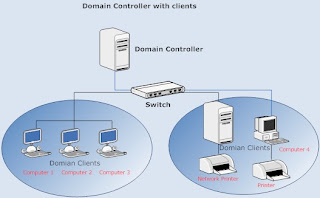On Microsoft
Servers, a domain controller (DC) is a server that responds to security
authentication requests (logging in, checking permissions, etc.) within the
Windows Server domain.[1] A domain is a concept introduced in Windows NT
whereby a user may be granted access to a number of computer resources with the
use of a single username and password combination
Windows NT
Older
versions of Windows such as Windows NT server, one domain controller per domain
was configured as the Primary Domain Controller (PDC); all other domain controllers
were Backup Domain Controllers (BDC).
A BDC could
authenticate the users in a domain, but all updates to the domain (new users,
changed passwords, group membership, etc.) could only be made via the PDC,
which would then propagate these changes to all BDCs in the domain. If the PDC
was unavailable (or unable to communicate with the user requesting the change),
the update would fail. If the PDC was permanently unavailable (e.g. if the
machine failed), an existing BDC could be promoted to be a PDC. Because of the
critical nature of the PDC, best practices dictated that the PDC should be
dedicated solely to domain services, and not used for file/print/application
services that could slow down or crash the system. Some network administrators
took the additional step of having a dedicated BDC online for the express
purpose of being available for promotion if the PDC failed.
Windows 2000
Windows 2000
and later versions introduced Active Directory ("AD"), which largely
eliminated the concept of primary and backup domain controllers in favor of
multi-master replication.
However,
there are still several roles that only one domain controller can perform,
called the Flexible single master operation roles (some of these roles must be
filled by one DC per domain, while others only require one DC per AD Forest).
If the server performing one of these roles is lost the domain can still
function, and if the server will not be available again, an administrator can
designate an alternate DC to assume the role (a process known as
"seizing" the role).
As defined
by Microsoft, in Active Directory server roles, computers that function as
servers within a domain can have one of two roles: member server or domain
controller. Abbreviated as DC, domain controller is a serveron a Microsoft
Windows or Windows NT network that is responsible for allowing host access to
Windows domain resources. The domain controllers in your network are the
centerpiece of your Active Directory directory service. It stores user account information,
authenticates users and enforces security policy for a Windows domain.
Domain Name,
Domain Name Search,
Domain Name India,
Get Domain Name,
Free Domain Name,
Domain Name System,
Domain Name Suggestions,
Buy Domain Name,
Web Hosting,
Er Ratnesh Porwal
Software Engineer
www.AeroSoftCorp.com
www.AeroSoft.in
www.AeroSoft.co.in
www.AeroSoftseo.com
On Line Assistence :
Gtalk : ratnesh.aerosoft@gmail.com
Y! Messenger : ratnesh.AeroSoft@yahoo.com
Rediff Bol ratnesh.AeroSoft@rediffmail.
Software Engineer
www.AeroSoftCorp.com
www.AeroSoft.in
www.AeroSoft.co.in
www.AeroSoftseo.com
On Line Assistence :
Gtalk : ratnesh.aerosoft@gmail.com
Y! Messenger : ratnesh.AeroSoft@yahoo.com
Rediff Bol ratnesh.AeroSoft@rediffmail.

No comments:
Post a Comment